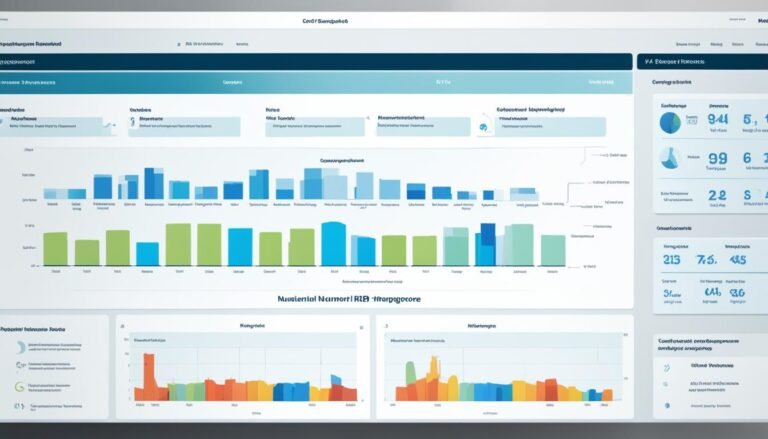A Guide to HR Employee Empowerment Strategies
Welcome to our comprehensive guide on HR employee empowerment strategies. In today’s competitive business landscape, organizations are recognizing the significance of empowering their workforce to drive engagement, boost performance, and foster a culture of innovation. By implementing effective employee empowerment programs and embracing proven HR best practices, companies can unlock the full potential of their employees.
Employee empowerment is a management philosophy that emphasizes granting employees the autonomy to make independent decisions and take ownership of their work. This approach has been proven to lead to motivated employees, greater trust in leadership, improved creativity, and a stronger bottom line. In this article, we will explore different strategies, techniques, and leadership approaches that can empower your employees and elevate your organization’s performance.
Key Takeaways:
- Employee empowerment is a management philosophy that promotes independent decision-making and action.
- Implementing HR employee empowerment strategies can result in motivated employees, greater trust in leadership, improved creativity, and a stronger bottom line.
- Key strategies for empowering employees include active listening, recognition, fostering trust, building confidence, providing flexibility, soliciting feedback, and supporting professional growth.
- Employee empowerment offers advantages such as increased motivation, enriched company culture, enhanced problem-solving, reduced employee attrition, and improved business outcomes.
- To improve employee empowerment, organizations can focus on delegation, setting clear boundaries, offering resources and flexibility, emphasizing results, encouraging employee input, and supporting continuous learning.
The Definition and Importance of Empowerment
Empowerment is the act of enabling someone to perform certain acts or duties. In the context of the workplace, employee empowerment refers to the practice of giving employees the authority, resources, and support they need to make decisions and take action. This philosophy is crucial for creating a culture of trust, motivation, and autonomy within an organization.
Employee empowerment is of utmost importance in today’s dynamic work environment. When employees feel empowered, they are more motivated to excel in their roles, take ownership of their work, and contribute to the success of the organization. By giving employees the autonomy to make decisions and the necessary tools to succeed, organizations can foster a sense of trust and engagement.
Empowered employees are more likely to trust their leaders and have confidence in their decisions. This, in turn, leads to a positive work environment where collaboration and innovation thrive. By encouraging creativity and empowering employees to think outside the box, organizations can benefit from fresh ideas and unique perspectives that drive growth and success.
But the benefits of employee empowerment don’t stop there. When employees feel empowered, it creates a ripple effect that positively impacts the bottom line of the organization. Motivated employees who are trusted to make decisions and take action are more likely to go above and beyond in their work, resulting in increased productivity, efficiency, and ultimately, improved business outcomes.
Overall, empowerment is a key driver of employee motivation, trust in leadership, creativity, and the bottom line. Organizations that prioritize employee empowerment create a culture that values and respects their employees, leading to greater job satisfaction, retention, and overall success.
“Empowerment is not about giving people power, it’s about creating a culture where people already have it.” – Unknown
| Benefits of Employee Empowerment | Description |
|---|---|
| Employee Motivation | Empowered employees are more motivated and engaged in their work, leading to higher levels of productivity and job satisfaction. |
| Trust in Leadership | When employees feel empowered, they develop a greater sense of trust in their leaders, leading to stronger relationships and improved communication. |
| Creativity | Empowered employees are more likely to think creatively and contribute innovative ideas to solve problems and drive organizational growth. |
| Bottom Line | Employee empowerment directly impacts the bottom line by increasing productivity, improving customer satisfaction, and driving business success. |
Employee empowerment is a powerful tool that organizations can utilize to create a positive and thriving work environment. By providing employees with the autonomy, trust, and resources they need, organizations can unlock the full potential of their workforce and achieve sustained success.
Strategies for Empowering Employees
Empowering employees is vital for creating a positive work environment and driving organizational success. Here are several key strategies that can help in employee empowerment:
- Listening and Recognition: Actively listen to your employees’ ideas, concerns, and feedback. Recognize their contributions and achievements to show appreciation and boost morale.
- Fostering Trust and Psychological Safety: Create an atmosphere of trust where employees feel safe to share their opinions and take calculated risks without fear of negative consequences.
- Building Employee Confidence: Support employee growth and development by providing incentives, rewards, and recognition. This boosts their confidence and encourages them to take on challenges.
- Offering Flexibility: Granting flexibility in work arrangements, such as flexible hours or remote work options, helps employees achieve a better work-life balance and increases job satisfaction.
- Feedback and Action: Encourage a culture of open feedback where employees can express their ideas, concerns, and suggestions. Take prompt action on the feedback received to illustrate that their opinions matter.
- Supporting Professional Growth: Provide opportunities for professional development, such as coaching, mentoring, and training programs. This not only enhances employee skills but also demonstrates a commitment to their long-term career growth.
By implementing these employee empowerment techniques, organizations can create a supportive and inclusive work environment, fostering employee autonomy and motivation. When employees feel empowered, they are more likely to contribute their best, leading to improved performance and organizational success.
Benefits of Employee Empowerment
Employee empowerment offers numerous benefits for organizations. When employees feel empowered, they become motivated and driven to excel in their work, leading to increased productivity and a stronger bottom line. The following are key advantages of employee empowerment:
- Motivated employees: Empowerment fosters a sense of ownership and responsibility, motivating employees to go above and beyond.
- Trust in leadership: By empowering employees, organizations demonstrate faith in their abilities, which builds trust in leadership.
- Improved creativity: When empowered, employees are more likely to think creatively, explore new ideas, and innovate.
- Stronger bottom line: Empowered employees contribute to higher productivity and efficiency, leading to improved financial performance.
- Employee retention: Empowerment creates a positive work environment and fosters employee satisfaction, reducing turnover rates.
Empowering employees not only benefits individuals but also strengthens the overall organizational culture and performance.
| Benefits of Employee Empowerment | Key Details |
|---|---|
| Motivated employees | Empowerment leads to higher levels of motivation among employees. |
| Trust in leadership | Empowered employees develop trust in leadership, creating a positive work environment. |
| Improved creativity | Empowered employees are more likely to think creatively and generate innovative ideas. |
| Stronger bottom line | Employee empowerment contributes to increased productivity and financial success. |
| Employee retention | Empowered employees are more likely to remain with the organization, reducing turnover. |
The benefits of employee empowerment go beyond individual motivation and satisfaction. They have a direct impact on organizational success and create a work environment conducive to innovation and growth.
Improving Employee Empowerment
Improving employee empowerment is essential for creating a motivated and engaged workforce. By implementing effective strategies and providing the necessary resources, organizations can empower employees to take ownership of their work and contribute to the company’s success.
Tips for Empowering Employees
Here are some tips for improving employee empowerment:
- Delegation: Delegate work responsibilities to employees, giving them the opportunity to take on new challenges and demonstrate their skills.
- Setting Clear Boundaries: Define clear boundaries and expectations, ensuring employees understand their roles and responsibilities within the organization.
- Flexibility: Provide flexibility in work arrangements, allowing employees to have control over their schedules and work-life balance.
- Providing Resources: Ensure employees have the necessary resources, such as tools, training, and support, to effectively perform their jobs.
- Focusing on Results: Encourage employees to focus on results rather than processes, giving them the freedom to explore different approaches to achieve their goals.
- Employee Input: Seek and value employee input for process improvement, allowing them to contribute their ideas and suggestions to enhance work processes.
- Professional Development: Support employee professional development through training programs, mentorship, and opportunities for career growth.
- Continuous Learning: Foster a culture of continuous learning by promoting knowledge sharing and providing access to resources for ongoing education and skill development.
By implementing these tips and empowering employees, organizations can create an environment where employees feel valued, motivated, and empowered to contribute their best. This leads to higher employee engagement, improved performance, and ultimately, better business outcomes.
Advantages of Employee Empowerment
Employee empowerment offers numerous advantages that contribute to the success of organizations. By empowering employees, businesses can witness higher levels of motivation and productivity, cultivate a positive and diverse company culture, enhance problem-solving capabilities, and make confident and effective decisions. Additionally, employee empowerment plays a crucial role in reducing employee attrition, fostering trust in leadership, improving the customer experience, and ultimately, driving better business outcomes.
Increased Motivation and Productivity: Empowered employees are more motivated as they feel a sense of ownership and responsibility towards their work. They are driven to accomplish goals, go the extra mile, and contribute their best efforts, leading to increased productivity levels and a more efficient workforce.
Enriched Company Culture: Employee empowerment allows for the cultivation of a positive and inclusive company culture. Through empowerment initiatives, organizations can create an environment that values diversity, encourages collaboration, and promotes open communication. This inclusive culture fosters innovation, creativity, and a strong sense of belonging among employees.
Enhanced Problem Solving: Empowered employees are more likely to think creatively and develop innovative solutions to complex problems. By providing autonomy and encouraging independent decision-making, organizations can tap into the diverse perspectives and ideas of their employees, leading to more effective problem-solving strategies.
Confident Decision Making: When employees are empowered, they gain the confidence to make decisions and take ownership of their work. This autonomy allows them to act in the best interest of the organization and make decisions aligned with organizational goals, resulting in more efficient and timely decision-making processes.
Reduced Employee Attrition: Employee empowerment plays a pivotal role in reducing employee attrition rates. Empowered employees feel valued and engaged, leading to higher job satisfaction and a stronger commitment to the organization. This, in turn, reduces staff turnover and the associated costs of hiring and training new employees.
Greater Trust in Leadership: By empowering employees, organizations build trust in their leadership. When employees have the freedom to make decisions and take initiative, they develop a sense of trust in their leaders’ ability to guide and support them. This trust forms the foundation for strong employee-manager relationships and a positive work environment.
Improved Customer Experience: Employee empowerment directly correlates with an improved customer experience. Empowered employees have the confidence and autonomy to provide exceptional customer service, make quick and informed decisions, and resolve customer issues effectively. This positive customer experience contributes to customer loyalty and business growth.
Better Business Outcomes: Ultimately, employee empowerment leads to better business outcomes. Motivated and empowered employees contribute to increased productivity, higher levels of customer satisfaction, improved innovation and problem-solving, and ultimately, enhanced business performance and profitability.
Employee empowerment is a strategic approach that brings significant benefits to organizations. By embracing employee empowerment and implementing effective strategies, businesses can create a culture of motivation, productivity, innovation, and trust, ultimately driving their success and growth.
Employee Empowerment Techniques
Employee empowerment techniques play a vital role in creating a work environment where employees feel valued, motivated, and empowered to make a difference. By implementing these techniques, organizations can foster a culture of engagement and continuous growth. Here are some key techniques that can empower employees:
1. Providing Feedback
Regular feedback is crucial for employee development and empowerment. By offering constructive feedback, managers can help employees understand their strengths and areas for improvement, enabling them to grow both personally and professionally.
2. Recognition Programs
Implementing recognition programs can have a significant impact on employee engagement and motivation. By publicly acknowledging and rewarding employees’ efforts and achievements, organizations can create a positive and empowering culture.
3. Professional Growth Opportunities
Offering opportunities for professional growth, such as training programs, workshops, and conferences, allows employees to enhance their skills and knowledge. This not only empowers them to take on new challenges but also demonstrates the organization’s commitment to their development.
4. Fostering an Empowering Culture
An empowering culture is one where employees feel trusted, respected, and encouraged to express their ideas and opinions. By creating an inclusive and supportive environment, organizations empower employees to contribute to decision-making processes and drive positive change.
5. Feedback Collection
Actively collecting feedback from employees is essential for understanding their needs, concerns, and suggestions. Organizations can utilize surveys, focus groups, and one-on-one meetings to gather valuable insights and make data-driven decisions.
6. Coaching and Mentoring
Providing coaching and mentoring opportunities enables employees to learn from experienced professionals and gain valuable guidance. This support system not only empowers employees but also facilitates their professional development and helps them navigate challenges.
7. Self-paced Learning
Encouraging self-paced learning allows employees to take ownership of their development journey. Organizations can provide resources such as online courses, educational materials, and knowledge-sharing platforms to empower employees to continuously learn and grow.
8. Rewards for Efforts and Progress
Recognizing and rewarding employees for their efforts and progress is crucial for sustaining their motivation and fostering a sense of accomplishment. Whether through financial incentives, promotions, or special privileges, rewards provide employees with tangible recognition for their hard work.
By implementing these employee empowerment techniques, organizations can create a supportive and empowering work environment, where employees feel valued and motivated to achieve their full potential.
The Power of Employee Empowerment in Practice
Employee empowerment is a critical component of fostering a motivated and engaged workforce. However, there can often be a disconnect between the desire for empowerment and the ability to make autonomous decisions. This gap is known as the decision deficit, which can lead to frustration among employees and leaders alike.
Reducing the decision deficit is crucial for creating a work environment that promotes autonomy and empowers employees. Leaders can employ various strategies to bridge this gap:
- Providing training and support: Offering employees the necessary knowledge and skills to make informed decisions gives them the confidence to take ownership of their work and contribute effectively to the organization.
- Clarifying expectations: Clearly communicating objectives and goals ensures that employees understand what is expected of them and feel equipped to make decisions aligned with organizational objectives.
- Offering decision-making frameworks: Providing employees with structured frameworks or guidelines for decision-making can help them navigate complex situations and make sound choices.
- Delegating authority: Granting employees the authority to make decisions within their areas of expertise not only empowers them but also allows leaders to focus on strategic matters.
- Creating a culture that promotes autonomy: Cultivating an environment where innovation and independent thinking are encouraged fosters employee confidence and reduces the decision deficit.
By implementing these strategies, organizations can reduce the decision deficit, thereby minimizing employee frustration and enhancing overall workforce effectiveness. Empowered employees are more likely to take ownership of their work, make proactive decisions, and contribute to the success of the organization.
Image: Autonomy in decision making
Conclusion
Employee empowerment plays a critical role in creating a motivated and engaged workforce. By implementing HR employee empowerment strategies and embracing effective employee empowerment programs, organizations can unlock numerous benefits. These include increased employee motivation, trust in leadership, creativity, and improved bottom-line results.
By utilizing employee engagement techniques and HR best practices, organizations can foster an empowering culture that values and supports employee development and empowerment. This includes providing opportunities for professional growth, offering flexibility in work arrangements, and promoting leadership strategies for employee empowerment.
By fostering employee autonomy and motivation, organizations can create an environment where employees feel empowered and motivated to contribute their best. Through workplace empowerment initiatives and empowering workforce strategies, organizations can cultivate a culture of trust, open communication, and continuous learning.







